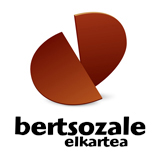Library - View details To know more about this section
"Ábrase esa rueda, vuélvase a cerrar" : la construcción de la identidad mediante el canto de coplas
 Article:
Spanish.
Online
Article:
Spanish.
Online
- Author(s)
- Mirande, Maria Eduarda
- Title
- "Ábrase esa rueda, vuélvase a cerrar" : la construcción de la identidad mediante el canto de coplas / María Eduarda Mirande
- In
- Cuadernos de la Facultad de Humanidades y Ciencias Sociales - Universidad de Jujuy, 27, 2005, 99-110
- Subjects
- Canto con caja ; Argentina
- Content
-
Testu osoa
- Type of material
- Article
- ISBN / ISSN
- 0327-1471
- Notes
- Bibliografia: 109-110 or.
In the province of San Salvador de Jujuy, more precisely in the Quebrada deHumahuaca and the Puna regions, the cult of copla singing is a phenomenon stillalive among the social practices of native communities.
This work aims at analyzing the function of copla singing in the identity buildup of its performers, concerning both the individual dimension where the copla singeris set apart as a subject with a specific social role, as well as the collective projectionthat singer and song shed onto their community.
Two cult tinted festivities become the subject matter of our study: the“Encuentro de copleros” celebrated annually in Purmamarca during the first days ofJanuary and the “Topamiento de comadres” which takes place on the Thursdaybefore Carnival celebrations. On both occasions copla performer circles areorganized. These circles constitute true scenarios for the formation and circulationof figurative processes, through which the subject constructs himself as such andalso forms a world –view. In circles, a central role is played by the performer’s voiceand body, elements mentioned in a subgroup of coplas dealing with the singing,singer and performance.
This presentation analyzes the ritual celebration of copla performer circlesfrom a semiotic perspective, establishing discursive relationships with the textsregistered during the already mentioned festivities.
Key Words: identity build - coplas - "topamiento de comadres" - "encuentro decopleros".
This work aims at analyzing the function of copla singing in the identity buildup of its performers, concerning both the individual dimension where the copla singeris set apart as a subject with a specific social role, as well as the collective projectionthat singer and song shed onto their community.
Two cult tinted festivities become the subject matter of our study: the“Encuentro de copleros” celebrated annually in Purmamarca during the first days ofJanuary and the “Topamiento de comadres” which takes place on the Thursdaybefore Carnival celebrations. On both occasions copla performer circles areorganized. These circles constitute true scenarios for the formation and circulationof figurative processes, through which the subject constructs himself as such andalso forms a world –view. In circles, a central role is played by the performer’s voiceand body, elements mentioned in a subgroup of coplas dealing with the singing,singer and performance.
This presentation analyzes the ritual celebration of copla performer circlesfrom a semiotic perspective, establishing discursive relationships with the textsregistered during the already mentioned festivities.
Key Words: identity build - coplas - "topamiento de comadres" - "encuentro decopleros".


